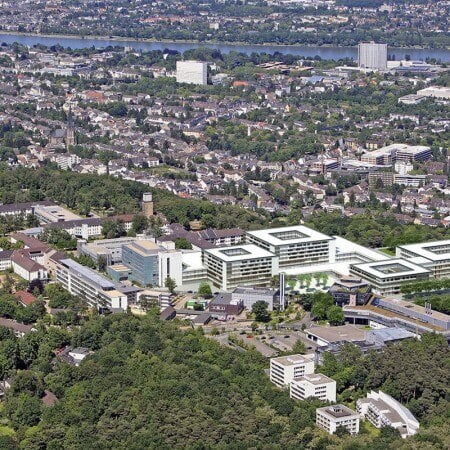Gastrointestinal carcinoid tumors are rare neoplasms, usually adenocarcinomas. Less often, these are carcinoid tumors, lymphomas, or sarcomas. They develop in one of three sections of the small bowel, namely the duodenum, jejunum, or ileum. Doctors in specialized centers abroad have experience in treating even rare types of neoplasms. You can travel abroad for the best chance of beating cancer.
Content
- Diagnostics
- Treatment principles
- Surgery for small bowel cancer
- Systemic chemotherapy
- Local (intraperitoneal) chemotherapy
- Radiation therapy
- Immunotherapy
- Why is it worth undergoing cancer treatment abroad?
Diagnostics
The first symptoms of small bowel cancer are usually abdominal pain, nausea, vomiting, and weight loss. When localized in the duodenum, jaundice develops. Due to bleeding, the feces may turn black.
As the tumor progresses, this blocks the small bowel and causes an obstruction. Cancer can rarely be diagnosed after intestinal perforation.
Endoscopic and radiation methods are used to diagnose the disease.
Options for endoscopic examinations include:
- esophagogastroduodenoscopy allows detecting duodenal tumors;
- double balloon enteroscopy can be used to examine the rest of the small intestine;
- capsule endoscopy provides an examination of the entire bowel using a tiny video camera swallowed by a patient (the method does not allow a biopsy).
A biopsy is required to confirm the diagnosis. This is usually performed during an endoscopic procedure.
Medical imaging techniques are mainly used to clarify the stage of the disease:
Computed tomography can be used to look for metastases. However, a primary small bowel tumor is not always well visualized with this method. A contrast agent helps to improve the accuracy of diagnosis. This is delivered to the small bowel through a tube inserted through the mouth or nose.
MRI can be used less often. This method is an alternative to computed tomography, has a comparable informative value, and can also be performed with small bowel contrast. Magnetic resonance imaging provides more information about soft tissues than a CT scan.
Diagnostic laparoscopy can be used in cases where it is impossible to understand by other means whether cancer is operable. A doctor inserts a thin tube with a video camera into the abdominal cavity and examines it from the inside. During this minor operation, a biopsy can be performed if tumor samples cannot be obtained endoscopically.
Treatment principles
Small bowel cancer can be operable or inoperable.
Surgery is considered the main treatment for resectable cancer. A doctor can remove the tumor completely. To do this, he performs a segmental small bowel resection. Sometimes a patient also requires the removal of a part of the bowel. When the tumor is localized in the initial section of the small bowel, a pancreatoduodenal resection is performed (a pancreatoduodenectomy or the Whipple procedure).
A patient may not receive any other treatment after surgery for early-stage cancer. But more often than not, doctors use chemotherapy, and some patients also receive radiation therapy.
In the case of an inoperable cancer, there is still a hope that it will become operable. Doctors may use chemotherapy and radiation therapy to try to shrink the tumor. With a good response to therapy, the subsequent removal of the neoplasm is possible.
But more often than not, inoperable cancer is detected after the spread of metastases, so the disease cannot be completely cured. However, it can be controlled for a long time. Doctors perform palliative surgery to ensure that food passes through the small bowel. To control tumor growth, healthcare professionals use chemotherapy, sometimes along with radiation therapy.
Surgery for small bowel cancer
Surgical treatment of gastrointestinal carcinoid tumors is the main method of dealing with this malignant tumor. Doctors perform two groups of operations, namely radical and palliative interventions. Radical interventions can be performed in cases where cancer can be cured completely. If cancer is detected at an advanced stage, the main goals of a surgical intervention are to reduce the tumor mass, eliminate and prevent complications, and increase the length and quality of the patient's life.
Segmental resection is the main radical operation for gastrointestinal carcinoid tumors. Doctors cut through the bowel above and below the tumor. The ends are then sutured to restore the integrity of the gastrointestinal tract. The surrounding fatty tissue with the lymph nodes is also removed. In some cases, a large bowel resection is required. A section of the large bowel is captured along with a fragment of the small bowel.
In the standard version, the small bowel resection is performed through a large abdominal incision. In some Oncology Centers, the intervention can also be performed laparoscopically through short incisions. After such an operation, the risk of complications is lower, and recovery is easier and faster.
Pancreatoduodenectomy is a surgical procedure performed when the tumor is localized in the duodenum. This is the initial section of the small bowel, which is located immediately behind the stomach. During the surgical intervention, the part of the bowel affected by the tumor is removed along with the head of the pancreas, a part of the stomach, gallbladder, and bile ducts. Doctors then perform a reconstructive phase of the operation: they connect the rest of the small bowel to the stomach, and restore the outflow of bile and pancreatic juice to this area to ensure normal digestion. Pancreaticoduodenectomy is a complex intervention that is best done in Oncology Centers with extensive experience. Some hospitals perform this surgery using a minimally invasive laparoscopic method.
Palliative surgery does not aim to cure oncology, but to eliminate an intestinal obstruction and create conditions for achieving a therapeutic effect with the help of chemotherapy. Doctors perform bypass surgery to redirect food around the tumor. Endoscopic treatment can also be performed. Doctors place a stent inside the intestine, which is a dense tube that does not allow the tumor mass to close the lumen of the small bowel.
Systemic chemotherapy
Chemotherapy is considered the second most important treatment of gastrointestinal carcinoid tumors. A patient is injected with drugs through a vein that are distributed throughout the body. Chemotherapy for cancer is a systemic treatment method that affects all cancer cells at once, regardless of where they are located.
Small bowel cancer is a tumor that is not highly sensitive to chemotherapy drugs. But still, most patients receive this type of treatment, as it allows them to achieve some success: slowing down the tumor growth, reducing the risk of a recurrence after surgery, as well as increasing the life expectancy of patients with metastases.
Local (intraperitoneal) chemotherapy
Since systemic chemotherapy for small bowel cancer is not very effective, local chemotherapy for cancer has become a treatment option abroad. The most widespread treatment method is HIPEC (hyperthermic intraperitoneal chemotherapy). Immediately after surgery to remove a tumor that has spread to the peritoneum, doctors rinse the abdominal cavity with a heated solution of chemotherapy drugs. A perfusion lasts about an hour and a half.
This type of treatment is more effective, since the concentration of drugs is much higher than that achieved with a systemic administration of chemotherapy agents. In addition, systemic toxicity is minimal, since most of the drugs are not absorbed into the bloodstream but act locally, only in the area where the malignant tumor is located.
Nonetheless, the drugs penetrate only to a depth of 2-3 mm. Therefore, the treatment method is not suitable for the destruction of large tumor foci. This is effective only in combination with surgery. Most of the tumor mass is removed during surgery, and then hyperthermic intraperitoneal chemotherapy destroys the remaining cancer cells to prevent the cancer from recurring.
Radiation therapy
Radiation therapy for small bowel cancer can be used infrequently. This can be used in the following two cases:
- advanced cancer;
- after surgery to remove the tumor.
At an advanced stage of the disease, doctors use radiotherapy to prevent and manage complications, as well as reduce the severity of symptoms of the condition. With the help of radiation therapy, the tumor can be shrunk or stabilized in size. Doctors can act both on the primary tumor in the bowel and on cancer metastases.
Radiation therapy can rarely be used after surgery. So far, there is no data on whether this treatment helps to prevent relapse or whether it increases the survival rate for patients.
Immunotherapy
In some patients, immunotherapy can be used for cancer treatment. Doctors prescribe immune checkpoint inhibitors. These drugs remove the "mask" from the tumor, blocking its ability to evade the immune response.
This type of treatment is not suitable for all patients. It is prescribed in the advanced stages of cancer, only in the presence of mutations in the mismatch repair (MMR) system or microsatellite instability (MSI). Genetic tests are required to determine whether immunotherapy will help a person.
Why is it worth undergoing cancer treatment abroad?
You can go abroad for cancer treatment. When doing so, you can expect a safer and less traumatic treatment with better results. There are a few reasons for you to undergo your treatment abroad:
- modern and well-equipped hospitals;
- a high probability of curing operable cancer;
- a qualitatively performed reconstructive stage of the operation allows patients to maintain normal digestion, which ensures a high quality of life after the completion of treatment;
- some hospitals perform not only open, but also minimally invasive laparoscopic operations;
- doctors use modern chemotherapy regimens that provide the best therapeutic results;
- surgery to remove a tumor that has spread to the peritoneum is followed by hyperthermic intraperitoneal chemotherapy, which reduces the risk of cancer recurrence;
- foreign cancer hospitals use the latest types of radiotherapy that destroy the tumor with minimal damage to the surrounding healthy tissues.
You are welcome to use the Booking Health service to find the cost of treatment abroad in different hospitals. The website presents the actual cost of treatment, depending on the procedures and operations used. You can compare prices to make an appointment for treatment abroad at the best price.
The cost of treatment will be reduced due to the absence of additional taxes for foreign patients when making your treatment appointment through the Booking Health service. The initial cost of treatment will not increase, even if additional medical procedures are required, as you will receive insurance to cover unforeseen expenses.
By making your treatment appointment at a clinic through the Booking Health service, you save yourself the trouble of organizing your trip abroad. We will help you to choose a medical center, translate documents, book a hotel and buy airline tickets. Our staff will meet you at the airport abroad and take you to the hospital by car.
Authors:
The article was edited by medical experts, board certified doctors Dr. Nadezhda Ivanisova and Dr. Vadim Zhiliuk. For the treatment of the conditions referred to in the article, you must consult a doctor; the information in the article is not intended for self-medication!
Our editorial policy, which details our commitment to accuracy and transparency, is available here. Click this link to review our policies.
Sources:
National Cancer Institute
American Cancer Society
Mayo Clinic


















